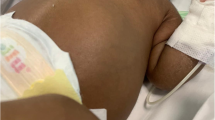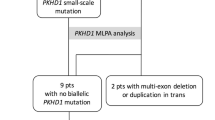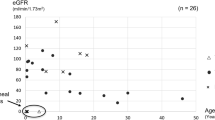Abstract
Background
Autosomal recessive polycystic kidney disease (ARPKD) constitutes an important cause of pediatric end stage renal disease and is characterized by a broad phenotypic variability. The disease is caused by mutations in a single gene, Polycystic Kidney and Hepatic Disease 1 (PKHD1), which encodes a large transmembrane protein of poorly understood function called fibrocystin. Based on current knowledge of genotype–phenotype correlations in ARPKD, two truncating mutations are considered to result in a severe phenotype with peri- or neonatal mortality. Infants surviving the neonatal period are expected to carry at least one missense mutation.
Case-Diagnosis/Treatment
We report on a female patient with two truncating PKHD1 mutations who survived the first 30 months of life without renal replacement therapy. Our patient carries not only a known stop mutation, c.8011C>T (p.Arg2671*), but also the previously reported c.51A>G PKHD1 sequence variant of unknown significance in exon 2. Using functional in vitro studies we have confirmed the pathogenic nature of c.51A>G, demonstrating activation of a new donor splice site in intron 2 that results in a frameshift mutation and generation of a premature stop codon.
Conclusions
This case illustrates the importance of functional mutation analyses and also raises questions regarding the current belief that the presence of at least one missense mutation is necessary for perinatal survival in ARPKD.

Similar content being viewed by others
References
Harris PC, Torres VE (2009) Polycystic kidney disease. Annu Rev Med 60:321–337
Hartung EA, Guay-Woodford LM (2014) Autosomal recessive polycystic kidney disease: a hepatorenal fibrocystic disorder with pleiotropic effects. Pediatrics 134:e833–e845
Guay-Woodford LM, Bissler JJ, Braun MC, Bockenhauer D, Cadnapaphornchai MA, Dell KM, Kerecuk L, Liebau MC, Alonso-Peclet MH, Shneider B, Emre S, Heller T, Kamath BM, Murray KF, Moise K, Eichenwald EE, Evans J, Keller RL, Wilkins-Haug L, Bergmann C, Gunay-Aygun M, Hooper SR, Hardy KK, Hartung EA, Streisand R, Perrone R, Moxey-Mims M (2014) Consensus expert recommendations for the diagnosis and management of autosomal recessive polycystic kidney disease: report of an international conference. J Pediatr 165:611–617
Ward CJ, Hogan MC, Rossetti S, Walker D, Sneddon T, Wang X, Kubly V, Cunningham JM, Bacallao R, Ishibashi M, Milliner DS, Torres VE, Harris PC (2002) The gene mutated in autosomal recessive polycystic kidney disease encodes a large, receptor-like protein. Nat Genet 30:259–269
Bergmann C, Senderek J, Windelen E, Küpper F, Middeldorf I, Schneider F, Dornia C, Rudnik-Schöneborn S, Konrad M, Schmitt CP, Seeman T, Neuhaus TJ, Vester U, Kirfel J, Büttner R, Zerres K, APN (Arbeitsgemeinschaft für Pädiatrische Nephrologie), (2005) Clinical consequences of PKHD1 mutations in 164 patients with autosomal-recessive polycystic kidney disease (ARPKD). Kidney Int 67:829–848
Frank V, Zerres K, Bergmann C (2014) Transcriptional complexity in autosomal recessive polycystic kidney disease. Clin J Am Soc Nephrol 9:1729–1736
Nagasawa Y, Matthiesen S, Onuchic LF, Hou X, Bergmann C, Esquivel E, Senderek J, Ren Z, Zeltner R, Furu L, Avner E, Moser M, Somlo S, Guay-Woodford L, Büttner R, Zerres K, Germino GG (2002) Identification and characterization of Pkhd1, the mouse orthologue of the human ARPKD gene. J Am Soc Nephrol 13:2246–2258
Onuchic LF, Furu L, Nagasawa Y, Hou X, Eggermann T, Ren Z, Bergmann C, Senderek J, Esquivel E, Zeltner R, Rudnik-Schöneborn S, Mrug M, Sweeney W, Avner ED, Zerres K, Guay-Woodford LM, Somlo S, Germino GG (2002) PKHD1, the polycystic kidney and hepatic disease 1 gene, encodes a novel large protein containing multiple immunoglobulin-like plexin-transcription-factor domains and parallel beta-helix 1 repeats. Am J Hum Genet 70:1305–1317
Denamur E, Delezoide A-L, Alberti C, Bourillon A, Gubler MC, Bouvier R, Pascaud O, Elion J, Grandchamp B, Michel-Calemard L, Missy P, Zaccaria I, Le Nagard H, Gerard B, Loirat C, Société Française de Foetopathologie, Barbet J, Beaufrère AM, Berchel C, Bessières B, Boudjemaa S, Buenerd A, Carles D, Clemenson A, Dechelotte P, Devisme L, Dijoud F, Espérandieu O, Fallet C, Gonzalès M, Hillion Y, Jacob B, Joubert M, Kermanach P, Lallemand A, Laquerrière A, Laurent N, Liprandi A, Loeuillet L, Loget P, Martinovic J, Ménez F, Narcy F, Roux JJ, Rouleau-Dubois C, Sinico M, Tantau J, Wann AR (2010) Genotype–phenotype correlations in fetuses and neonates with autosomal recessive polycystic kidney disease. Kidney Int 77:350–358
Guay-Woodford LM, Desmond RA (2003) Autosomal recessive polycystic kidney disease: the clinical experience in North America. Pediatrics 111:1072–1080
Adeva M, El-Youssef M, Rossetti S, Kamath PS, Kubly V, Consugar MB, Milliner DM, King BF, Torres VE, Harris PC (2006) Clinical and molecular characterization defines a broadened spectrum of autosomal recessive polycystic kidney disease (ARPKD). Medicine (Baltimore) 85:1–21
Gunay-Aygun M, Tuchman M, Font-Montgomery E, Lukose L, Edwards H, Garcia A, Ausavarat S, Ziegler SG, Piwnica-Worms K, Bryant J, Bernardini I, Fischer R, Huizing M, Guay-Woodford L, Gahl WA (2010) PKHD1 sequence variations in 78 children and adults with autosomal recessive polycystic kidney disease and congenital hepatic fibrosis. Mol Genet Metab 99:160–173
Bergmann C, Senderek J, Sedlacek B, Pegiazoglou I, Puglia P, Eggermann T, Rudnik-Schöneborn S, Furu L, Onuchic LF, De Baca M, Germino GG, Guay-Woodford L, Somlo S, Moser M, Büttner R, Zerres K (2003) Spectrum of mutations in the gene for autosomal recessive polycystic kidney disease (ARPKD/PKHD1). J Am Soc Nephrol 14:76–89
Boddu R, Yang C, O’Connor AK, Hendrickson RC, Boone B, Cui X, Garcia-Gonzalez M, Igarashi P, Onuchic LF, Germino GG, Guay-Woodford LM (2014) Intragenic motifs regulate the transcriptional complexity of Pkhd1/PKHD1. J Mol Med 92:1045–1056
Ebner K, Feldkoetter M, Ariceta G, Bergmann C, Buettner R, Doyon A, Duzova A, Goebel H, Haffner D, Hero B, Hoppe B, Illig T, Jankauskiene A, Klopp N, König J, Litwin M, Mekahli D, Ranchin B, Sander A, Testa S, Weber LT, Wicher D, Yuzbasioglu A, Zerres K, Dötsch J, Schaefer F, Liebau MC, ESCAPE Study Group; GPN Study Group (2015) Rationale, design and objectives of ARegPKD, a European ARPKD registry study. BMC Nephrol 16:22
Acknowledgments
MCL was supported by grants of the German Society for Pediatric Nephrology, the European Society for Paediatric Nephrology, the German PKD foundation, the Koeln Fortune program, the GEROK program of the Medical Faculty of University of Cologne and the Marga and Walter Boll-Foundation. MCL and BS are supported by the German Federal Ministry of Research and Education (BMBF grant 01GM1515; NEOCYST consortium.). KE was supported by the Koeln Fortune program of the Medical Faculty of University of Cologne. BS was supported by the German Research Foundation (Deutsche Forschungsgemeinschaft, DFG SCHE 1562/6).
Publisher’s Note
Springer Nature remains neutral with regard to jurisdictional claims in published maps and institutional affiliations.
Author information
Authors and Affiliations
Corresponding author
Ethics declarations
Financial disclosure
All authors report that they have no financial relationships relevant to this article to disclose.
Conflict of interest
All authors report that they have no potential conflicts of interest to disclose.
Rights and permissions
About this article
Cite this article
Ebner, K., Dafinger, C., Ortiz-Bruechle, N. et al. Challenges in establishing genotype–phenotype correlations in ARPKD: case report on a toddler with two severe PKHD1 mutations. Pediatr Nephrol 32, 1269–1273 (2017). https://doi.org/10.1007/s00467-017-3648-x
Received:
Revised:
Accepted:
Published:
Issue Date:
DOI: https://doi.org/10.1007/s00467-017-3648-x




